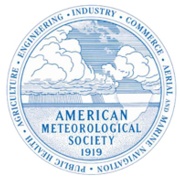Mike Nelson, Chief Meteorologist, KMGH-TV

Please describe your educational background and what sparked your interest in atmospheric or related sciences.
Weather has been my favorite subject since I was 7 years old! I credit a powerful thunderstorm that roared through my Madison, WI, neighborhood as my introduction to the wonders of weather.
I received my degree in Meteorology from the University of Wisconsin–Madison. I began my weather career in 1976 at Weather Central, a Madison-based weather consulting firm, specializing in forecasts for TV, radio, agribusiness, ski areas, and utilities.
In 1979, I partnered with fellow UW meteorologist, Terry Kelly, in helping to develop one of the first computer weather graphics system for television. This pioneering system eventually became the world's most widely used television weather graphics system! It is now part of IBM - The Weather Company!
In the mid-1980s, I served a four year term on the AMS Broadcast Board, reviewing and judging many meteorologists for their AMS Seal of Approval.
I enjoy sharing my knowledge of the weather with young and old, visiting nearly 100 schools, clubs, charities and service organizations each year. My "Tornado Dance" is a much-anticipated event! I estimate that I have spoken to nearly 1,000,000 children in my 40-year career!
What was your first job in the field and how did you end up in the job you are in now?
In 1985, my family and I moved to St Louis, MO, where I served as Chief Meteorologist for KMOV-TV until 1991. We moved to Denver in 1991 and I have been forecasting the weather in Colorado ever since. I am currently the Chief Meteorologist for Denver 7 KMGH-TV.
I have authored two books on weather and climate, The Colorado Weather Almanac (2007) and The Colorado Weather Book (1999). I have also written numerous weather pamphlets and articles for magazines.
I now spend considerable time writing, speaking and teaching about the science and the dangers of global warming. I recently served for three years as the Chair of the AMS Station Scientist Committee.
During my broadcast career, I have won 20 Emmy awards for Weather Excellence. I am also a recipient of the Edward R. Murrow Award and a two-time winner of the Colorado Broadcaster of the Year award.
In 2001, I was recognized by the Colorado Broadcasters Association as their "Citizen of the Year" for my volunteer work in Colorado schools.
In 2016, I was inducted into the Silver Circle of the National Association of Television Arts and Sciences – recognizing my many years of service to the broadcast industry.
I was named a Fellow of the American Meteorological Society in 2019. Only 25 AMS Fellows have ever come from the broadcast meteorology sector.
What opportunities did you pursue that you knew would be beneficial to securing a job in the profession?
As a teenager, I was very fortunate to have Terry Kelly, the best TV meteorologist in Madison, frequent the Baskin-Robbins Ice Cream store where I worked. I would give him a big scoop of Jamoca ice cream and ask him weather questions. I finally worked up the courage to ask for a job! I told him I would empty his trash and answer his phone - for free! He hired me at minimum wage and I then worked him for the next 10 years! It always pays to ask!
What other courses/skills beyond the required math and science courses do you think would be the most helpful to individuals wanting a career in your profession?
I knew that I wanted to be a broadcast meteorologist since I was in middle school! As I went through my schooling, I studied all of the math and science, but also took classes in creative writing and participated in the high school dramas and musicals.
What is your typical day on the job like?
I speak to schools a day or two a week in the morning, but my main day begins around 1:30 PM. Map analysis (mostly on a computer anymore) and forecasting come first. Radio feeds, graphic creation and show preparation is next. I usually handle the 4, 5, 6 and 10 PM weathercasts. I also spend a lot of time answering e-mail and posting to social media.
What do you like most about your job? What is the most challenging thing about your job?
I love forecasting! Severe storms are always exciting and challenging. Our mission as Station Scientists provides us an opportunity to educate the public about the dangers of climate change.
Does your job allow for a good work/life balance? If not, why?
Working late into the evening always makes family life a challenge. When my children were little, I would try very hard to get home for dinner, even if just for 45 minutes, in order to see them.
Over the course of your career what is the most exciting thing that has happened to you?
Blizzards, tornadoes, flash floods are always exciting. I also did get a few opportunities to fill in on the national morning shows.
Is there anything you wish you had done differently in your career?
I have worked hard and had some good success. It has been a good career and I will keep doing it for a few more years.
What are some ‘must haves’’ on a resume if a person wants to gain employment in your field?
Although one can be successful without a degree in meteorology, it is much more challenging. Study hard, learn your weather and stay up to date!